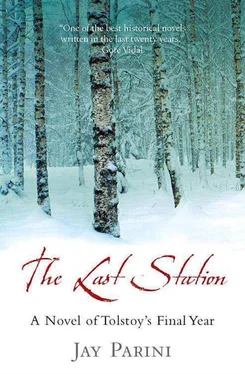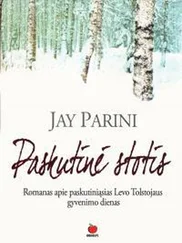Naturally when I read your story, my dear one, I saw that I was Dublitsky. How could I think otherwise? I realized that I am what I am: Uncle Leo, an old, uncommonly plain – even ugly – character who should concern himself with God’s work and nothing more. I should do God’s work and do it well, and that should be enough for me. But I become miserable when I think of you, when I recall that I am Dublitsky. I am reminded of my age and the impossibility of happiness. For me, anyway. Yes, I am Dublitsky. But to marry simply because I need a wife is something beyond my ken. I can’t do it. I would ask of my future wife something terrible , impossible: I insist on being loved as I love. Forget about me. I shall not bother you anymore .
I’d have stabbed myself in the breast a thousand times if that could have made a difference. I cursed myself for giving him my story. What had I been thinking? For days I was inconsolable.
A week later, I sat at the piano, comforting myself with a light Italian score, a waltz called ‘Il Bacio,’ the kiss. There was a knock at the door. It was Lyovochka, his eyes sunken like potholes beneath his bushy brows. I may misremember this, but he smelled of lavender.
He sat beside me at the piano and said, ‘I’ve been carrying a letter in my pocket for several days now. Will you read it, Sonya? It’s for you.’
I quietly took the letter down the hall to my room, locking myself in to read it. My hands trembling, the characters difficult to see through my tears, I read: ‘Would you possibly consent to be my wife?’
‘Open this door!’ Lisa shrieked. She knew exactly what was going on. ‘Sonya! Open this door.’
I peeked out.
‘What has he written to you? Tell me frankly.’
‘He has offered me his hand in marriage.’
Her face tightened. She seemed fit to burst, like an overripe tomato. ‘Refuse him, Sonya! Say no!’ She began to pull at her own hair, ‘I will die if you don’t. It’s intolerable!’
Such a scene! I adored every minute of it, of course, but I kept my composure. At least somebody in this house was worthy of the title Countess Tolstoy.
Mama came scuffling down the hall when she heard the commontion. She dragged Lisa, kicking and squealing like a pig, back to her room. ‘What the count must think!’ Mama cried.
‘You must go into the parlor and deliver your response,’ she said to me flatly. All possible pleasure had drained from the scene she had so long anticipated.
I found Lyovochka standing against the wall, his face white as a sail. He wrung his hands.
‘So?’ he asked. I heard a note of resignation in that question, and my heart went out to him. The poor, dear man!
‘Yes,’ I said. ‘Yes, I will marry you, Leo Nikolayevich.’
Soon an avalanche broke over our heads, what with servants rushing about, Lisa weeping beside me, Tanya shouting in her vulgar way, Mama offering drinks. Everyone was there but Papa, who pretended he was ill. In truth, he was upset that the count had revealed such bad manners. He should first have asked Papa. Indeed, he should have asked for Lisa’s hand. It took several days and much coaxing by Mama to bring him round, but he acquiesced. He always did.
Life became miserable again too quickly. Lyovochka, in a fit of honesty, gave me his diaries. I was honored, at first, and thrilled. It seemed wonderfully romantic to read the most private thoughts of one’s future husband!
One sentence hangs in my memory like a black crow: ‘I consider the company of women a necessary evil and avoid it when possible. Women are the source of all frivolity, all sensuality and indolence, all the vices to which men are prone.’ He went on to recount the whole disgusting story of endless nights on the town in Moscow, St Petersburg, even Tula and Sevastopol! Whores and peasant women of all stripes had shared his bed!
I read on with disbelief, learning that he had lost his innocence as a boy of fourteen in Kazan, led to a brothel by his elder brother Sergey, who’d specialized in debauchery from the beginning. After he had performed the disgusting act, he stood by the harlot’s bedside, weeping. It was as if he foresaw all.
And there was more. I heard for the first time about Axinya, the peasant woman who had served his vile needs for three years before our marriage. I could have borne this were it not for their son, Timothy, who haunts us still. The hideous, dim-witted Timothy, who snorts and guffaws, who prowls our house like a demon spirit from hell. Worse, he looks just like Lyovochka: the same height, the same slightly rounded shoulders, the unmistakable eyebrows and wispy spume of a beard! He has Lyovochka’s profile, too, with the fleshy nose and jutting chin. A loathsome parody of my husband, he lurches about Yasnaya Polyana, carrying wood, doing errands, creeping in the shadows.
I have begged my husband to get rid of Timothy, to send him to Moscow, at least. We are never there anyway. But the Master wants his sins to cluster about him. He wants to suffer, to see that grotesque reflection of himself at every turn.
I married Leo Tolstoy, the great author, on 23 September 1862, at eight o’clock, in the Church of the Nativity of the Virgin, right under the Kremlin’s long, imperial shadow.
‘How can I live without your company?’ my sister Tanya said, as I was leaving the church.
‘Try, my dear. Try.’
I was pleased to slough off the old life. I was tired of being beholden to Papa, plagued by doubts about my future life. My life was settled, once and for all.
Oh, was it settled.
They laugh at me. They giggle and sneer behind my back. Even the servants have caught on to their little game. Just the other day I heard the maids saying, ‘The doctor is such a little runt – and a dunce.’ They get this kind of talk from Sofya Andreyevna, I suspect. She dislikes me. But what can one expect from a woman like her, who wastes her days snuffling around behind Leo Nikolayevich’s back like a dog, trying to unearth some new bone of discord. She suspects that Chertkov has convinced her husband to draft a new will that bequeaths his writing to the world after his death. He has always said he wants to do this, and it’s the obvious thing for him to do. But Sofya Andreyevna wants the royalties. How else could she support all the servants, the big house, the torrent of guests and outings and trips to Moscow, dresses from St Petersburg? Her avarice is as legendary as her inability to understand her husband’s principles. As Leo Nikolayevich often says to her, one should not expect to make a profit from books written for the sake of humanity. It offends him that anyone, let alone the poor, should have to pay to read what he has written.
But I feel sorry for Sofya Andreyevna. It’s not that she is a bad woman. She simply does not understand what her husband has accomplished. Her soul is not copious enough to absorb his dreams for the improvement of humanity. On the other hand, they don’t require immense effort to comprehend. The poor shall inherit the earth. The first shall be last, and the last shall be first. And so forth. Everything Leo Nikolayevich says has all been said before. In the realm of religion and ethics, one does not invent the truth; one discovers and proclaims it.
Leo Nikolayevich is the great proclaimer.
I am not, however, so foolish as to think that he is Christ. Christ is Christ. But Leo Nikolayevich is certainly one of his prophets. I am lucky to know him as well as I do. I am more than his personal physician. I am his friend.
I began reading Tolstoy as a medical student in Prague. Strolling amid that city’s amber stones or sitting in the cathedral while the organist practiced for Sunday morning services, I would meditate on his message. Later, in Hungary, I dedicated myself to his writings. Soon I wrote to him asking for advice, informing him that I had been sought out by local Tolstoyans to lead their group.
Читать дальше












